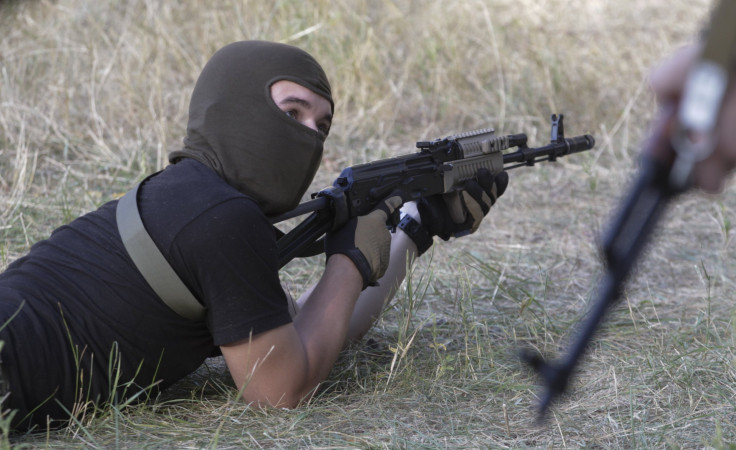Ukraine And Pro-Russia Rebels Agree To Friday Cease-Fire As Fighting Rages On

Ukraine government representatives and pro-Russian rebels are expected to go along with a cease-fire agreement Friday provided planned talks go through in Minsk, Belarus, where the two sides have been negotiating for the past week, Ukrainian President Petro Poroshenko said Thursday. Poroshenko called the cease-fire the first step in “the implementation” of a lasting peace plan, but the deal hasn't been set in stone.
UPDATE 2:23 p.m. EDT: Poroshenko expresses his "cautious optimism" for ceasefire talks in Minsk Friday morning at a NATO-Ukraine press conference at the NATO summit in Wales, UK.
Rebels and Ukrainian government forces spent Thursday exchanging artillery barrages around Mariupol, a city of around 500,000 on the coast of the Sea of Azov. Pro-Russian forces launched an offensive on the Sea of Azov coast last week.
The cease-fire is scheduled to take effect at 11:00 a.m. GMT, 2:00 p.m. Kiev/Donetsk time on Friday. Rebel representatives have agreed to the potential cease-fire, according to Russian media. Russian President Vladimir Putin has also thrown his weight behind the peace plan, urging both sides to stop fighting. But Ukrainian Prime Minister Arseny Yatsenyuk said Putin’s words could not be trusted.
Shelling on the outskirts of Mariupol #Ukraine
- Simon Ostrovsky (@SimonOstrovsky) September 4, 2014Azov battalion fighters take firing positions at the eastern checkpoints of #Mariupol. They say enemy tanks can arrive any minute
- Petr Shelomovskiy (@shelomovskiy) September 4, 2014Poroshenko joined world leaders at the NATO summit in Wales Thursday to condemn Russia for its alleged involvement in eastern Ukraine. Leaders decided whether or not to apply additional economic sanctions on Russia a day after France announced it was postponing a controversial delivery of a powerful helicopter carrier to Russia. NATO Secretary- General Anders Fogh Rasmussen outright claimed "Russia is attacking Ukraine" at the summit, further solidifying NATO's pro-Ukrainian stance.
The key element of my peace plan is a ceasefire. Hopefully, its implementation will start tomorrow. #NATO #NATOforUkraine
- Петро Порошенко (@poroshenko) September 4, 2014Over 2,600 people have been killed in the conflict between the pro-Western Ukrainian government and a contingency of pro-Russian rebels in the historically Russian-speaking east. NATO, the EU and the U.N. have all accused Russia of first supplying rebels and then directly engaging in fighting with Ukrainian forces. Russia denies it is involved in the fighting.
© Copyright IBTimes 2025. All rights reserved.






















